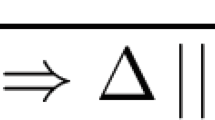Abstract
We consider the computational complexity of the word problem for finitely generated Heyting and modal algebras. It is shown that the word problem is PSPACE-complete if only constant modal terms or only 0-generated modal algebras are considered; similar results are obtained for two-variable terms and 2-generated Heyting algebras. It is also shown that, if an equation of positive terms is refuted in a Heyting algebra, it is refuted in a 2-generated Heyting algebra. We also consider the word problem for certain classes of modal and Heyting algebras and obtain results similar to those mentioned above for infinite families of such classes. The results are optimal in the number of generators: reduction in the number of generators leads to polynomial-time decidable word problems.



Similar content being viewed by others
REFERENCES
A. Thue, “Probleme über Veränderungen von Zeichenreihen nach gegebenen Regeln,” Videnskabsselsk. Skr. I. Mat.-Naturvidensk. KI., 10 (1914).
A. A. Markov, “Impossibility of certain algorithms in the theory of associative systems,” Dokl. Akad. Nauk SSSR 55 (7), 587–590 (1947).
E. L. Post, “Recursive unsolvability of a problem of Thue,” J. Symbolic Logic 12 (1), 1–11 (1947). https://doi.org/10.2307/2267170
S. I. Adian and V. G. Durnev, “Decision problems for groups and semigroups,” Russ. Math. Surv. 55 (2), 207–296 (2000). https://doi.org/10.1070/RM2000v055n02ABEH000267
R. E. Ladner, “The computational complexity of provability in systems of modal propositional logic,” SIAM J. Comput. 6 (3), 467–480 (1977). https://doi.org/10.1137/0206033
R. Statman, “Intuitionistic propositional logic is polynomial-space complete,” Theor. Comput. Sci. 9 (1), 67–72 (1979). https://doi.org/10.1016/0304-3975(79)90006-9
L. A. Levin, “Universal sequential search problems,” Probl. Inf. Transm. 9 (3), 265–266 (1973).
S. A. Cook, “The complexity of theorem-proving procedures,” in Proc. Third Annual ACM Symposium on Theory of Computing (STOC’71), Shaker Heights, Ohio, 1971, pp. 151–158. https://doi.org/10.1145/800157.805047
M. N. Rybakov, “The complexity of the problem of resolving basic and formal logics,” Logicheskie Issled. 10, 158–166 (2003).
M. N. Rybakov, “Complexity of a variable-free fragment of propositional dynamic logic,” Vestn. Tver. Gos. Univ. Ser. Prikl. Mat., No. 2 (5), 5–17 (2007).
A. Chagrov and M. Rybakov, “How many variables does one need to prove PSPACE-hardness of modal logics?,” Adv. Modal Logic 4, 71–82 (2003).
S. Demri, P. Schnoebelen, “The complexity of propositional linear temporal logics in simple cases,” Information and Comput. 174, 84–103 (2002).
J. Y. Halpern, “The effect of bounding the number of primitive propositions and the depth of nesting on the complexity of modal logic,” Artificial Intelligence 75 (2), 361–372 (1995).
M. Rybakov, “Complexity of finite-variable fragments of EXPTIME-complete logics,” J. Appl. Non-Classical Logics 17 (3), 359–382 (2007). https://doi.org/10.3166/jancl.17.359-382
M. Rybakov, “Complexity of intuitionistic propositional logic and its fragments,” J. Appl. Non-Classical Logics 18 (2–3), 267–292 (2008). https://doi.org/10.3166/jancl.18.267-292
M. Rybakov and D. Shkatov, “Complexity and expressivity of branching- and alternating-time temporal logics with finitely many variables,” in Theoretical Aspects of Computing–ICTAC 2018, Ed. by B. Fischer and T. Uustalu, Lecture Notes in Computer Science, Vol. 11187 (Springer, Cham, 2018), pp. 396–414. https://doi.org/10.1007/978-3-030-02508-3_21
M. Rybakov and D. Shkatov, “Complexity and expressivity of propositional dynamic logics with finitely many variables,” Logic J. IGPL 26 (5), 539–547 (2018). https://doi.org/10.1093/jigpal/jzy014
M. Rybakov and D. Shkatov, “Complexity of finite-variable fragments of propositional modal logics of symmetric frames,” Logic J. IGPL 27 (1), 60–68 (2019). https://doi.org/10.1093/jigpal/jzy018
M. Rybakov and D. Shkatov, “Complexity of finite-variable fragments of products with K,” J. Logic Comput. 31 (2), 426–443 (2021). https://doi.org/10.1093/logcom/exaa060
M. Rybakov, “Complexity of intuitionistic and Visser’s basic and formal logics in finitely many variables,” Adv. Modal Logic 6, 393–411 (2006).
E. Spaan, “Complexity of modal logics,” PhD thesis (Univ. van Amsterdam, 1993).
V. Švejdar, “The decision problem of provability logic with only one atom,” Arch. Math. Logic 42 (8), 763–768 (2003). https://doi.org/10.1007/s00153-003-0180-4
A. Chagrov and M. Zakharyaschev, Modal Logic (Oxford Univ. Press, Oxford, 1997).
C. H. Papadimitriou, Computational Complexity (Addison-Wesley, Reading, MA, 1995).
W. J. Savitch, “Relationships between nondeterministic and deterministic tape complexities,” J. Comput. Syst. Sci. 4 (2), 177–192 (1970). https://doi.org/10.1016/S0022-0000(70)80006-X
I. Nishimura, “On formulas of one variable in intuitionistic propositional calculus,” J. Symbolic Logic 25 (4), 327–331 (1960). https://doi.org/10.2307/2963526
V. A. Jankov, “The calculus of the weak “law of excluded middle,” Math. USSR-Izv. 2 (5), 997–1004 (1968). https://doi.org/10.1070/IM1968v002n05ABEH000690
S. I. Mardaev, “Embedding of implicative lattices in superintuitionistic logics,” Algebra Logika 26 (3), 318–357 (1987).
M. Rybakov and D. Shkatov, “Undecidability of first-order modal and intuitionistic logics with two variables and one monadic predicate letter,” Stud. Logica 107 (4), 695–717 (2019). https://doi.org/10.1007/s11225-018-9815-7
M. Rybakov and D. Shkatov, “Algorithmic properties of first-order modal logics of finite Kripke frames in restricted languages,” J. Logic Comput. 30 (7), 1305–1329 (2020). https://doi.org/10.1093/logcom/exaa041
M. Rybakov and D. Shkatov, “Algorithmic properties of first-order superintuitionistic logics of finite Kripke frames in restricted languages,” J. Logic Comput. 31 (2), 494–522 (2021). https://doi.org/10.1093/logcom/exaa091
Funding
The work is supported by Russian Science Foundation, project no. 21‑18‑00195.
Author information
Authors and Affiliations
Corresponding author
Ethics declarations
The author declares that he has no conflicts of interest.
About this article
Cite this article
Rybakov, M. Computational Complexity of the Word Problem in Modal and Heyting Algebras with a Small Number of Generators. Russ Math. 66, 33–48 (2022). https://doi.org/10.3103/S1066369X22050061
Received:
Revised:
Accepted:
Published:
Issue Date:
DOI: https://doi.org/10.3103/S1066369X22050061




